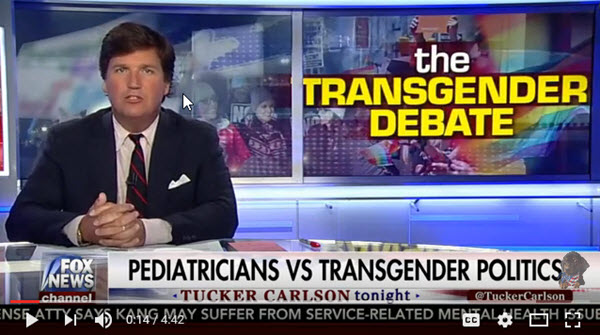Top Pediatrician Reveal Dangers of Transgender Ideology

Fox News 26 July 2017
TUCKER CARLSON (HOST): Michelle Cretella is the president of the American College of Pediatricians. She just wrote a piece in which she says, we’re quoting now, “Transgender ideology has infiltrated my field and produced large scale child abuse.” Cretella says doctors are encouraging parents to have their kids change genders when there is no evidence these changes are safe or even helpful. Dr. Cretella joins us now. Doctor, thanks a lot for weighing in on this. One of the reasons I wanted to talk to you is this is a field — I’m not sure what it is — of social science or medicine that is changing so fast that it’s hard to sort of know where we are exactly. And you’re in the practice of providing medicine to kids, so I wanted to get your perspective on it. What are you seeing?
MICHELLE CRETELLA: Thank you very much, Tucker. I’m glad to be here. I think it’s important to say that everyone on both sides of this issue is concerned about finding loving and helpful solutions for all children
.
CARLSON: Yes. I think that’s right.
CRETELLA: It — honestly. We at the American College of Pediatricians, and also I have many colleagues on the left, also insist that those solutions be rooted in reality, and transgender ideology is not. Sex is hard-wired from before birth, and it cannot change. And that’s why we had actually called this child abuse, because by feeding children and families these lies, children are having their normal psychological development interrupted. They’re even — they’re being put on the puberty blockers, which essentially castrates them chemically, followed by surgical mutilation later on. This is — this is child abuse. It’s not health care.
CARLSON: So, as you know, you will be, if you haven’t already, be accused of committing child abuse yourself and of being cruel and unloving and not caring for these kids, of imposing a medieval theology on modern children. How do you respond?
CRETELLA: Right, but as you said at the beginning, this is about science. We — what is going on now with the puberty blockers, followed by cross-sex hormones, followed by surgeries, has absolutely no track record whatsoever. The loving solution for children who are — children who are ages 3 to 10, they engage in magical thinking. They don’t know the difference so easily between fantasy and reality. We need to nurture them through adolescence, through natural puberty. Our job as parents and physicians is to help children embrace their healthy bodies. And when this is done, once they get past puberty into late adolescence, as many as 95 percent will come to embrace their bodies and identify with their biological sex.
CARLSON: So what happens — I mean, since this is not just something we’re debating as college students, but there are physicians involved who are prescribing drugs — what do we know about the effects of heavy-duty hormones, synthetic hormones given to little kids, like long-term?
CRETELLA: Right. Well, we don’t have long-term studies, which is a major problem. Which is why physicians should not be telling parents that this is settled science and that it is safe. We do know that when puberty blockers are used appropriately in other settings, that we have observed in adults — for example, they can be used to treat prostate cancer and some gynecologic issues in women — that there’s evidence that you can impact memory and cognitive ability in a negative way. And as far as the cross-sex hormones, if you have a young child on puberty blockers who goes directly to cross-sex or sex change hormones, they become sterile. You are sterilizing children. They can’t possibly — little children cannot possibly understand the risks of having a medication and then never being able to have children in the future.
CARLSON: So what’s the young — I didn’t know that, and there’s a lot I don’t know about this. Again, this is all happening so fast I don’t think most people really know what’s going on. But what’s the youngest age at which kids are getting these kind of drugs?
CRETELLA: The guidelines suggest that puberty blockers be given at ages 11 to 12, but I’ve had reports from colleagues across the country, and you can also find them in various news reports, that children as young as 9 have been put on these puberty blockers. And what it does, it arrests normal development. Puberty is not a disease. You’re stopping them. It’s not just a matter of sex characteristics. You’re arresting brain development.
CARLSON: No, it’s not. There’s a lot there.







